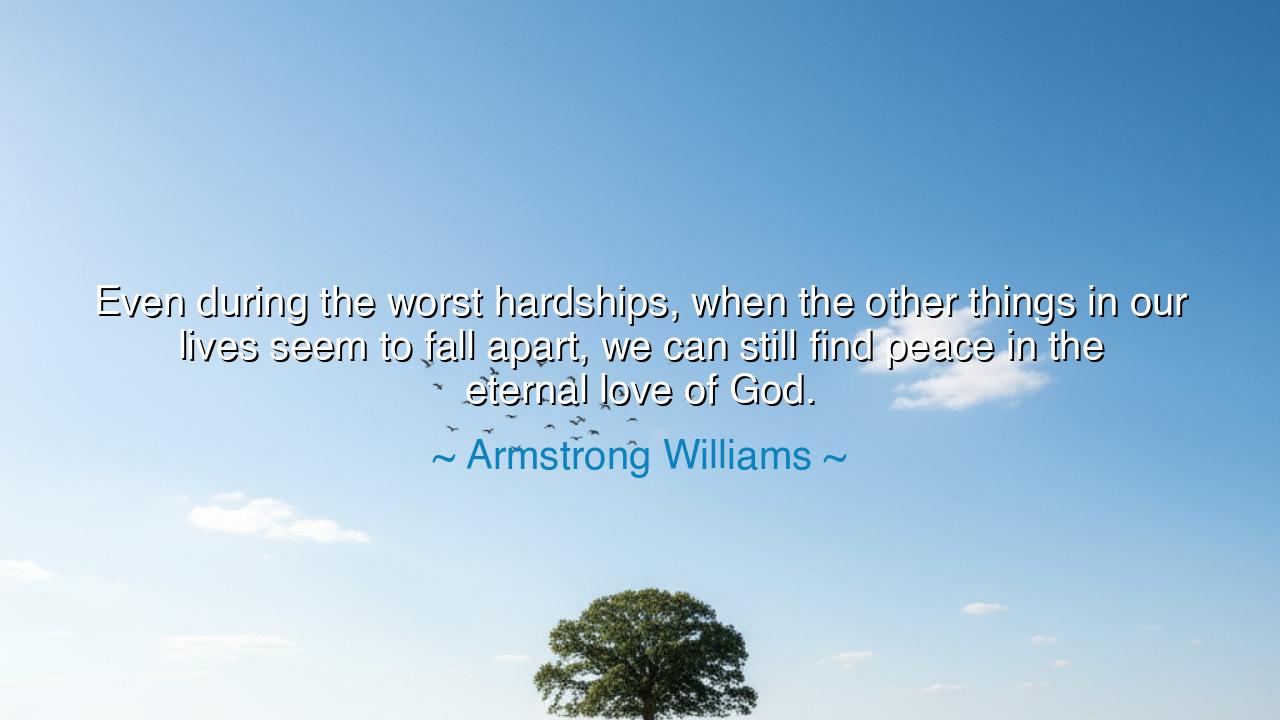
Even during the worst hardships, when the other things in our
Even during the worst hardships, when the other things in our lives seem to fall apart, we can still find peace in the eternal love of God.






Hear the steadfast words of Armstrong Williams: “Even during the worst hardships, when the other things in our lives seem to fall apart, we can still find peace in the eternal love of God.” This saying carries the fragrance of endurance, the strength of those who have walked through valleys of sorrow and emerged with faith unbroken. It speaks to the heart of human existence, that though storms may rage and kingdoms may crumble, there remains one anchor unshaken: the eternal love of God.
The meaning is clear yet profound. Life is not a path of unbroken joy. The fabric of existence often rends—families fracture, wealth is lost, health declines, friends depart. In such times, the soul may cry out in despair, believing itself abandoned. Yet Williams reminds us that while the world’s treasures may fail, there is a deeper peace that no storm can touch, for it flows from the love of God—unchanging, unending, and eternal. This love is not bound by circumstance, nor diminished by suffering. It is the bedrock upon which all faith stands.
History offers luminous testimony. Think of Corrie ten Boom, who, during the Holocaust, endured the darkness of Nazi concentration camps. She lost her family, her freedom, her health, yet even in the pit of despair, she clung to the eternal love of God, declaring that “there is no pit so deep that God’s love is not deeper still.” Her peace was not the peace of comfort, but the peace of a soul anchored in something greater than human cruelty. In her life, Williams’ words find living embodiment.
The ancients also knew this truth. In the early days of the Church, martyrs were thrown to lions, burned, or exiled, yet many met their deaths with songs upon their lips. How could such serenity arise amid such torment? It was because they did not seek their peace in the fleeting securities of this world, but in the love of God which endured beyond death. Their courage was not born of denial but of faith, a faith that saw beyond the crumbling walls of this life to the eternal refuge that cannot be shaken.
The lesson for us is timeless: we cannot prevent hardship from visiting our lives, but we can choose how we endure it. If our trust rests only upon wealth, health, or human approval, we will be broken when these are stripped away. But if our trust is rooted in the eternal love of God, then even in ruin we shall stand. For His love is the spring that does not dry up, the light that is not extinguished by night, the rock that does not yield beneath the storm.
Practical wisdom flows from this teaching. When trials come, do not seek only to escape them, but to anchor yourself in God’s love. In prayer, surrender your fear; in Scripture, refresh your weary soul; in fellowship, strengthen one another with reminders of hope. Do not let bitterness or despair consume you, for these are enemies of peace. Instead, lift your eyes to the eternal, and let the assurance of His love calm your troubled spirit.
Therefore, let this truth be written upon your heart: when all else falls apart, peace remains possible—not because life is gentle, but because God is faithful. Hardship may take from you much, but it cannot take the love of God, and in that love you may find rest. Walk in this knowledge, pass it down to those who come after you, and let your life be a testimony that even in the darkest hour, light remains, and that light is the eternal love of God.






YYenyen1608
I find this statement powerful, but it raises a complex question for me—does peace come from belief itself or from surrendering control? When someone accepts that certain things are beyond their understanding, is that what allows peace to emerge? I’m fascinated by the psychological side of this—how trust in something greater than ourselves might shift our emotional response to tragedy and uncertainty.
MTMinh Thu
There’s a lot of beauty in this sentiment, but I sometimes struggle with the idea that divine love alone can bring peace when real-world pain feels overwhelming. What about those who lose their faith because of hardship? Does this mean their peace becomes unreachable? I’d like to understand how people reconcile faith with suffering without feeling abandoned or disillusioned when life seems unbearably unfair.
HLNguyen Ha Linh
I really resonate with this message because it highlights the idea of unconditional love. Still, I question whether this sense of peace is accessible to everyone, regardless of their beliefs. Can people who don’t share a faith in God also find an equivalent form of peace through love, purpose, or community? It makes me curious about whether spirituality is essential for emotional resilience or just one of many paths.
Aalanwalker30102009
This quote feels deeply comforting, especially for people going through tough times. But I wonder, how does one actually experience peace through faith when everything around them is chaotic? Is it something that comes from prayer, or is it a mindset cultivated over time? I think many people struggle with connecting spiritual beliefs to emotional calm in real, practical ways during suffering.